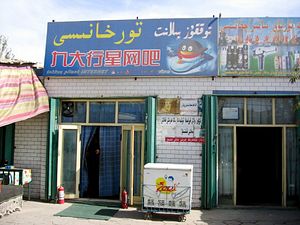In the early 2000s, Dilshat Perhat, a media studies student in China’s northwestern Uyghur region, launched a new kind of website called Diyarim. Describing Perhat as an innate entrepreneur, a friend said he was propelled by a keen interest in offering Uyghurs online services common on websites elsewhere in the world.
Perhat built novel technologies into Diyarim’s code as he developed MP3, video, and BBS (bulletin board system) forums. Featuring content including songs and music videos, forum debates about cultural and social issues and even re-posted clips from CNN, Diyarim attracted Uyghur students and intellectuals. The website was innovative in other ways, too; before 2004, only a handful of Uyghur websites used the Uyghur Arabic script and Diyarim was among the first. “For our generation, it felt like a new land, a new way to express yourself,” said Perhat’s friend.
Diyarim promoted Uyghur businesses and hired often underemployed, educated Uyghurs in the tech sector. Diyarim had offices in the regional capital, Urumchi, with 20 people in its cubicles, including video specialists and other skilled website technicians. The success of the site led it to be ranked as one of the top 100,000 sites globally in terms of numbers of users.
Perhat meticulously monitored Diyarim for discussion of sensitive topics, especially forbidding calls for incitement or independence. After several Uyghurs were killed in the Pearl River Delta region in June 2009, Uyghurs flooded Diyarim with calls for justice. On July 5, 2009, Uyghurs assembled in Urumchi to peacefully protest the killings. The invitation to demonstrate was made across forums run by Diyarim and similar websites. Although Perhat tried to moderate the posts, and even alerted police to them, when the dust settled, he was arrested and sentenced to five years for “endangering state security.”
Perhat’s fate is not uncommon, according to a new report on the Uyghur Internet from the Uyghur Human Rights Project. Webmasters and bloggers from Diyarim, Salkin, Orkhun, Xabnam and Uighurbiz all ended up in prison. As the researchers and writers of the report, we were able to speak to a number of people familiar with the Uyghur Internet. From interviews with experts and regular users, a pattern of systemic denial of freedom of expression and association emerged—all of it underpinned by a labyrinth of national and local regulations.
The unprecedented 10-month shutdown experienced after the 2009 protests was catastrophic for original writing in the Uyghur language. When the Internet was restored in May 2010, at least 80% of Uyghur-run websites, including Diyarim, were wiped from the web in what added up to a digital book burning of Uyghur content. On the forums of Diyarim and the other two most popular sites, Xabnam and Salkin alone, over 200,000 users had contributed over 2 million posts in 145,000 threads. Not a single website that was deleted by authorities after July 5 was devoted to religion. Instead, the sites were mainly devoted to literature, entertainment, culture and computers, based on a 2009 survey.
The 10-month shutdown was not an isolated case of leveraging a blackout to manage information on local incidents. Hanerik Township and Pichan County experienced communications cut offs in 2013 after outbreaks of unrest. China has framed these incidents as terrorism and, without access to accurate information, it is hard to substantiate such assertions.
Indeed, given the paucity of independent evidence, the Chinese authorities have taken to labeling peaceful dissenters as terrorists or separatists—in the case of Uyghur professor, Ilham Tohti, both accusations have been leveled.
A lot of discussion in the overseas media has surrounded accusations of Uyghurs viewing jihadi websites, often due to recent cases cited in the Chinese media. Xinjiang Party Chief Zhang Chunxian told reporters at the 2014 National People’s Congress that 90 percent of terrorists are using VPNs to access jihadi videos and propaganda unavailable in China. No reference was made as to where this figure originated from. While the possibility of an upswing of such material being found on Uyghur computer screens makes for attractive and salacious headlines, this is not borne out by the research undertaken for UHRP’s report.
What we did find is that in an environment where one Internet footprint could land them in jail, Uyghurs tended to heavily self-censor. Especially in the post-2009 period, “crackdowns” and “strike hard” campaigns became de rigueur for Chinese officials as they attempted to demonstrate control over the region. Furthermore, the research found that just as self-censorship increased, so did distrust of VPNs, even though they are commonly used in China to circumvent government blocking of websites such as Facebook and Twitter. Uyghurs knew if they in particular were found using one, it would have all kinds of negative consequences.
The story of the daily erosion of expression and association rights on the Uyghur Internet does not grab headlines. Nevertheless, Uyghurs’ inability to express concern about government policies affecting them or creating forums enabling others to freely express those opinions, more accurately describes the online environment and conditions in the region.
The lesson learned from talking to Uyghurs, Internet experts and web employees was not that there is a need for more control over allegedly inflammatory material, but one of China’s need to open up the Internet as a platform for rational solutions to one of China’s most intractable problems. Ilham Tohti offered his website, Uighurbiz, as a forum for the hard discussions required between Han and Uyghur to resolve the issues that exist between them. China has him in detention pending trial on charges of separatism and his website is no longer available. The Internet as a transformative tool for all people in China still has some way to go.
Henryk Szadziewski is senior researcher and Greg Fay is the project manager of the Washington, DC-based Uyghur Human Rights Project. They are the coauthors of Trapped in A Virtual Cage: Chinese State Repression of Uyghurs Online, which is available online here.

































